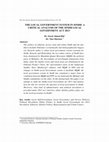Papers by Dr. Niaz Murtaza
istr.org
There is widespread recognition of the success of NGOs over the last two decades in reaching out ... more There is widespread recognition of the success of NGOs over the last two decades in reaching out to the poorest with timely, cost-effective and innovative programs at the community levels and advocating vociferously for the rights of marginalized groups nationally and ...
Voluntas: International Journal of Voluntary and …, 2011
The calls for NGO accountability have grown louder in recent years, some based on genuine concern... more The calls for NGO accountability have grown louder in recent years, some based on genuine concerns to help improve their performance and others on a desire to muffle their advocacy activities. Using a comprehensive analytical framework, this article finds that ...

Asian Journal of Social Science, 2012
Beset by serious governance problems, Pakistan is often called a failed state. Using the concepts... more Beset by serious governance problems, Pakistan is often called a failed state. Using the concepts of state-in-society, burdened societies and over-politicised states, this article argues that the nature of a society’s social and political structures, such as social inequality and ethnic divisions, determines the quality of governance institutions that can emerge within it at any given time. These structures emerge from the country’s pre-independence socio-political inheritances and then evolve under the influence of subsequent external and internal factors. In order to analyse a country’s future governance prospects and socio-economic trajectory, one must study the trajectory of these societal structures. Using this framework, the article concludes that while doomsday predictions about Pakistan’s collapse or take-over by religious extremists are inaccurate, it suffers from serious socio-economic problems, which will only resolve gradually if its societal structures evolve over the y...

The Government: Research Journal of Political Science, Vol.VII, 2018
The politics of ethnicity across rural and urban Sindh and the fact that it includes Pakistan’s e... more The politics of ethnicity across rural and urban Sindh and the fact that it includes Pakistan’s economically and demographically biggest city Karachi makes a robust local government system essential for Sindh. Karachi and Hyderabad, the two urban centres of Sindh have been dominated by Mutahida Qaumi Movement (MQM) the political party of Mohajirs, the descendants of non-Punjabi immigrants from India, while the smaller towns and rural areas are dominated by the Pakistan People’s Party, the representative party of the indigenous Sindhis. Since Musharraf’s alliance with MQM in 2002 and his changes in Sindh Local Government system to facilitate MQM, the local government system in Sindh has remained a major bone of contention between MQM and PPP on one hand and the Mohajir and Sindhi communities on the other. In this background, this paper is an attempt to study the Sindh Local Government Act 2013 and analyse how far this Act resolves the question of local government in Sindh. Moreover, what kind of administrative and political devolution is provided under 2013 act? And how ethnic identity politics plays out in the local governance in Sindh?
This study aimed: i) To briefly summarize Pakistan’s experiences with LG systems since 1947; ii) ... more This study aimed: i) To briefly summarize Pakistan’s experiences with LG systems since 1947; ii) To understand the contours of the Islamabad LG system 2015 and analyze whether the extent of administrative, financial and political devolution provided in it is sufficient to achieve the efficiency, effectiveness, equity and egalitarianism aims of LGs, iii) To compare the Islamabad LG system with earlier attempts at devolution in Pakistan and with the LG systems of 2-3 other capital cities globally, iv) To analyze the opinions of key stakeholders, including local councilors, communities and civil society members about the Islamabad LG system, v) To provide recommendations for improving the system in the future, and vi) To develop an advocacy agenda around the recommendations.










Uploads
Papers by Dr. Niaz Murtaza